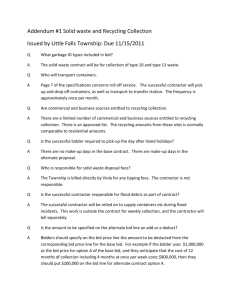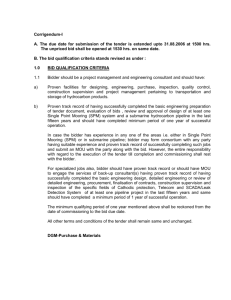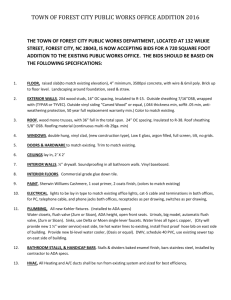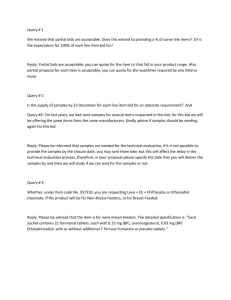Government Tenders And Procurement Law
advertisement
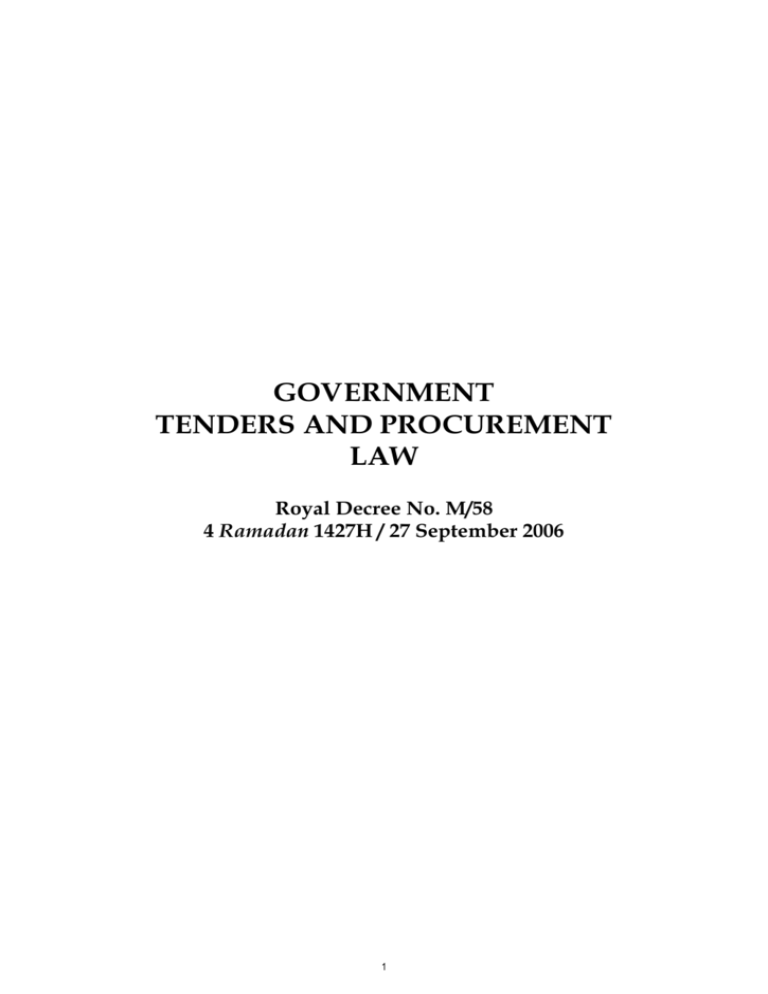
GOVERNMENT TENDERS AND PROCUREMENT LAW Royal Decree No. M/58 4 Ramadan 1427H / 27 September 2006 1 Basic Principles Article 1: This Law aims at (a) regulating procedures of tenders and procurements carried out by government authorities and ensuring they are not influenced by personal interest in order to protect the public funds; (b) achieving maximum degree of economic efficiency in government procurements and carrying out government projects at fair competitive prices; (c) promoting honesty and competition and ensuring fair treatment of suppliers and contractors in accordance with the principle of equal opportunities; (d) guaranteeing transparency in all stages of government tender and procurement procedures. Article 2: When inviting tenders and carrying out procurements, government authorities shall deal with individuals, establishments and companies licensed to engage in the business within the scope of which the work falls in accordance with applicable laws and rules. Page 2 Article 3: Without prejudice to provisions of Foreign Investment Law, all individuals, establishments and companies interested in dealing with the Government and are qualified for such dealings shall be given equal opportunities and shall be treated on equal footing. Article 4: Tenderers shall be provided with clear, complete and uniform information about the required work and shall be enabled to obtain such information at a specified time. Sufficient copies of the tender documents shall be provided to meet the requests of those interested in obtaining them. Article 5: Priority shall be given to national manufactured goods, products and services and to those treated as such. Article 6: All government works and procurements shall be put up for public tender except those exempted under the provisions of this Law. Page 3 Article 7: (a) All government tenders shall be announced in the Official Gazette, in two local newspapers and by electronic means of advertisement in accordance with the Implementing Regulations of this Law. The bid submission date and the sealed-bid opening date as well as places thereof shall also be specified in the tender announcement. (b) Works or projects of special nature, for which no supplier or contractor is available in the Kingdom, shall be announced abroad and within the Kingdom, in accordance with the stipulations of the preceding Paragraph. Article 8: Bids may only be accepted and contracted on in accordance with the conditions and specifications stipulated for them. Article 9: Procurements and execution of works and projects shall be carried out at fair prices that do not exceed the prevailing prices. Bidding is the practical means to achieving that in accordance with the provisions of this Law. Page 4 Submission of Bids and Opening of Sealed-Bids Article 10: Bids shall be submitted in sealed envelopes on the specified date and place. Bids submitted to or received by the Government Authority after the specified date shall not be accepted. Bids may be submitted and opened by electronic means in accordance with the Implementing Regulations of this Law. The Government Authority shall announce the names of companies and establishments which submitted bids. Article 11: A Bid shall be accompanied with a preliminary guarantee of 1% to 2% from one to two percent of its value in accordance with the tender terms. This guarantee is not required in the following cases: (a) Direct purchase unless in case of sealed-bids. (b) Contracts of agencies subject to this Law with each other and contracts with charities and public benefit associations, provided they execute the works themselves. Page 5 Article 12: (a) In public tenders, bids shall be valid for ninety days from the date specified for opening of sealed-bids. If a bidder withdraws his tender before the expiration of this period, his preliminary guarantee shall not be refunded. (b) The validity period of the bid and the preliminary guarantee shall only be extended with the consent of the bidder. Article 13: Total prices and any increase or decrease thereon shall be specified in the letter of the original bid. Any decrease submitted in a separate letter shall not be considered even if accompanying the bid. Tenderers may not, in cases other than those in which negotiation is permitted under the provisions of this Law, amend the prices of their bids, by increase or decrease, after submission. Article 14: A committee or more shall be formed in government authorities for opening sealed-bids. Said committee shall consist of not less than three members in addition to its chairman whose rank shall not be lower than the “Grade Ten” or its equivalent and a substitute member who shall complete the quorum in the absence of one Page 6 of the members. The committee shall be re-formed every three years. Article 15: Sealed-bids shall be opened in the presence of all members of the Sealed-bids Opening Committee on the specified date, and bid prices shall be announced to tenderers present or their representatives. This Committee shall submit its minutes along with the bid documents to the Bid Examination Committee within seven days from the sealed-bid opening date. Examination of Bids and the Power to Contract Article 16: (a) Each Governement Authority shall form one or more committees for the examination of bids of at least three members in addition to the chairman, whose rank shall not be lower than “Grade Thirteen” or its equivalent, provided that it includes a comptroller and a member qualified in law, in addition to a substitute member to complete the quorum in the absence of one of the members. This Committee shall submit its recommendations on awarding the bid to the best bidder in accordance with the provisions of this Law and its Implementing Regulations, and it may support its Page 7 recommendations with a report by specialized technicians. (b) The Committee shall be re-formed annually. Article 17: Chairmanship of the Bid Examination Committee and the power to decide on the award of bids may not be combined; likewise, chairmanship of the Sealed-bid Opening Committee and chairmanship of the Bid Examination Committee or membership of either committee may not be combined. Article 18: The Bid Examination Committee may be chaired by an official whose rank is not lower than “Grade Ten” or its equivalent, if not formed in the principal office of the Authority. Article 19: The Committee shall make its recommendations in the presence of all its members. Such recommendations shall be recorded in minutes, and the dissenting opinion, if any, shall be stated along with arguments supporting either opinion to be submitted to the official authorized to award the bid in accordance with the provisions of this Law. Page 8 Article 20: The Government Authority shall decide on tenders and approve the award of the bids within the specified bid validity period referred to in Article 12. After expiration of this period, necessary measures shall be taken to give the preliminary guarantees to their owners. Article 21: The Bid Examination Committee may negotiate with the bidder of the lowest bid that satisfies the conditions and specifications, then with the next bidder in the following two cases: (a) If bids are clearly higher than market prices, the Committee shall determine the amount of reduction to conform with market prices and shall request in writing, the bidder with the lowest bid to reduce his bid. If he refuses or does not reduce his bid to the specified amount, the Committee shall then negotiate with the next bidder, and so forth. If the specified price is not reached, the tender shall be cancelled and an invitation for new tender shall be made. (b) If the value of the bids exceeds the amounts allocated for the project, the Government Authority may cancel some items or reduce them to reach the amounts allocated, provided that this does not affect the utilization of the Page 9 project or the order of bids; otherwise, the tender shall be cancelled. Article 22: No bid may be excluded on grounds of its low prices unless it is less by 35% thirty five percent or more than the Government Authority's estimations and prevailing prices. The Bid Examination Committee may recommend that the bid is not to be excluded, after negotiating with the bidder, conducting the financial and technical analysis and becoming convinced of the bidder’s ability to execute the contract. Article 23: The Bid Examination Committee may recommend the exclusion of any bid, even if it is the lowest, if it appears that the bidder has a number of projects and the committee believes that the size of his contractual obligations rises to a level that exceeds his financial or technical abilities and affects the execution of his contractual obligations. In this case, it shall negotiate with the next bidder in accordance with the rules of negotiation determined by the provisions of this Law. Article 24: If only one bid is submitted or several bids are submitted but found– except for one– not to conform Page 10 with the terms and specifications, then such bid may not be accepted unless it is equal to prevailing prices and the work does not permit repeating the invitation of tenders, upon the approval of the competent minister or the head of the independent agency. Article 25: Without prejudice to the provisions of Articles 21 and 24 of this Law: (a) The invitation for tenders may only be cancelled for public interest or if its procedures violate the provisions of this Law or for material errors affecting the terms and specifications. The competent minister or the head of the independent agency shall have the power to cancel the tender. (b) The value of the tender documents shall be refunded to bidders if the responsibility of cancellation lies with the Governement Authority. Article 26: The Minister or the head of the independent agency shall have the power to decide on tenders and the execution of works. He may delegate this power to officials for amounts not exceeding three million riyals, provided that such delegation is graded according to the rank of the official authorized. Page 11 Contract Drafting and Execution Period Article 27: Contracts, their documents and annexes shall be drafted in Arabic. Another language beside Arabic may be used, provided that Arabic is the prevailing language for interpretation and execution of the contract as well as for determination of its specifications, plans and communications relating thereto. Article 28: (a) The execution period of continuing service contracts such as maintenance, cleaning, operation and catering, shall not exceed five years. Such period may be extended in contracts that require such extension with the approval of the Ministry of Finance. (b) Execution period of contracts of public work projects shall be proportionate with the amount and nature of the works and with the approved annual funds allocated for the project. Article 29: When drafting contracts, government authorities shall use contract forms approved in accordance with this Law. Page 12 Article 30: (a) The contract between the Government Authority and the succesful bidder shall be drafted after notifying him of the bid award and his submission of the final guarantee letter. (b) The work site shall be handed over to the contractor within sixty days from the date of awarding the bid. Article 31: In contracts whose value is three hundred thousand riyals or less, a Government Authority may use correspondences exchanged in lieu of drafting a contract. Article 32: Government authorities, agencies, organizations and public institutions shall submit their contracts whose execution period exceeds one year and whose value is five million riyals or more to the Ministry of Finance for review before concluding them. The Ministry of Finance shall review the contract within two weeks from the date of receiving it. If the Ministry fails to respond within this period, the contract shall be deemed approved. Page 13 Bank Guarantees Article 33: (a) The succesful bidder shall submit a final guarantee of 5% five percent of the contract value within ten days from date of awarding the bid. This period may be extended for a similar period. However, if he fails to do so within the specified period, the preliminary guarantee shall not be refunded, and negotiations shall be conducted with the next bidder, in accordance with the provisions of this Law. (b) In direct purchase, it is not required to submit a final guarantee unless deemed necessary by the contracting Government Authority. Agencies subject to the provisions of this Law, public institutions and companies in which the Government owns at least 51% fifty one percent of its capital as well as charities and public benefit associations shall be exempted from submitting the final guarantee, provided they execute the works themselves. (c) The final guarantee shall not be released until the contractor performs his obligations and, in public work contracts, until the end of the maintenance period and the final handover of the works. (d) In continuing execution contracts, the final guarantee shall be reduced annually according Page 14 to the works executed, provided that the guarantee is not less than 5% five percent of the value of the remaining works of the contract. Article 34: Guarantees shall be accepted if they are in accordance with one of the following forms: (a) A bank guarantee from a local bank. (b) A bank guarantee from a foreign bank to be submitted through a local bank operating in the Kingdom. (c) A cash guarantee in addition to a bank guarantee in cases relating to catering or which require urgent procurement in an amount not exceeding the cost of catering or cost of works for a period of three days. Article 35: The Implementing Regulations of this Law shall specify the conditions, terms and forms of the bank and financial guarantees. Page 15 Increase and Decrease of Contractor Obligations Article 36: A Government Authority may increase the obligations of the contractor within the scope of the contract to an extent not exceeding 10% ten percent of the total value of the contract or decrease such obligations to an extent not exceeding 20% twenty percent. The Implementing Regulations shall set forth the necessary controls. Payment of Entitlements Article 37: The value of the contracts shall be paid in Saudi riyals and may be paid in any other currency after coordination with the Ministry of Finance. The tender terms shall specify the currency in which the bid shall be submitted, provided that the value of the contract is not paid in more than one currency. Article 38: The Government Authority may pay to the contracting party an advance payment from his entitlements at the rate of 5% five percent of the total value of the contract, provided that the advance payment does not exceed fifty million riyals or its equivalent, against a bank guarantee equal to that payment. The advance payment, if any, shall be stated in the terms and Page 16 specifications when the call for tender is issued. This payment shall be deducted from the contractor’s claims for payment in installments starting from the first claim in accordance with the controls provided for in the Implementing Regulations. Article 39: The contractor’s entitlements shall be paid in installments according to the works completed and in accordance with the claims of payment approved by the Government Authority. Article 40: The last claim of payment, which shall not be less than 10% ten percent for public work contract and 5% five percent for other contracts, shall be paid after the initial handover of works or delivery of procurements. Article 41: A Government Authority may, if necessary, and after agreement with the Ministry of Finance, have some of its project executed and pay in a manner where cost is paid in annual installments, provided that such works are put for public tender. Page 17 Article 42: The total value of the contract shall cover all costs of its execution in accordance with its terms, including fees and taxes paid by the contractor. No exemption from them shall be allowed. Profits of parties contracting with the Government Authority or incomes of their employees may not be exempted from tax , nor may the tax be paid on their behalf except what is exempted by a special statutory provision. Article 43: In the event of an increase or decrease of customs tariff, fees, taxes or officially priced materials or services – after the bid submission date – the value of the contract shall be proportionally increased or decreased, as the case may be. Payment of the difference resulting from increase is subject to the following: (a) The contracting party shall prove payment of custom tariffs, fees, taxes, officially priced materials or services on the basis of categories affected by the increase due to delivery of materials for the contract works. (b) Amendment of custom tariffs, fees, taxes, or officially priced materials or services is not introduced after the expiration of the specified contract execution period, or the difference was incurred by the contractor as a result of delay in the execution of the contract unless he proves that such delay is for reasons beyond his control. Page 18 In all cases, the difference in fees, taxes or officially priced materials or services, if decreased, shall be deducted from the contractor unless he proves payment on the basis of the original categories prior to the amendment. Rules of Direct Purchase Article 44: In urgent cases, a Governement Authoirty’s procurements and works may be carried out by direct purchase, provided that the value of purchase does not exceed one million riyals. Article 45: (a) When carrying out works and procurements by direct purchase, at least three offers shall be obtained. These offers shall be examined by a committee formed by the competent minister or the head of the independent agency, provided that the cost does not exceed the prevailing market price. (b) The minister or the head of the independent agency shall have the power to decide on direct purchase. He may not delegate such power except within the limits of five hundred thousand riyals. Page 19 (c) Works and procurements whose value does not exceed thirty thousand riyals shall be carried out in the manner the Government Authority deems appropriate. (d) A Government Authority may obtain its direct purchase procurements through electronic means. Article 46: Procurements and works may not be split to make them eligible for direct purchase, nor may they be split to make them fall within the powers of delegated officials. Procurements and Works Exempted from Public Tenders Article 47: As an exception from public tenders, A Government Authority’s needs from the following works and procurements may be met in accordance with the specified methods for their purchase, even if their cost exceeds the eligibility of direct purchase: (a) Weapons and spare parts manufacturers. interest shall military equipment and their by direct purchase from The best offer serving public be selected by a ministerial Page 20 committee formed for this purpose by a royal decree of at least three members in addition to its chairman. It shall then bring its recommendations before the President of the Council of Ministers for approval. (b) Consultancy and technical works, studies, setting specifications, plans and supervision of their execution, services of accountants, lawyers and legal advisors by inviting five specialized offices licensed to provide such services to submit their bids within a period determined by the Government Authority. The award of the bid shall be determined in accordance with the provisions of Article 16 of this Law. (c) Spare parts of mechanical, electrical and electronic machines and equipment by inviting at least three specialists to submit their bids within a period determined by the Government Authority. The competent minister or the head of the independent agency shall form a committee to examine these bids and select the best of them. (d) Goods, constructions or services available only through one supplier, contractor or producer and with no acceptable alternatives, shall be procured by direct purchase subject to the approval of the competent minister or the head of the independent agency in accordance with the procedures provided for in the Implementing Regulations. Page 21 (e) Medical requisites urgently needed in case of outbreak of epidemics. Penalties and Extension of Contracts Article 48: If a contractor delays the execution of the contract beyond the specified time, he shall be subjected to a delay penalty not exceeding 6% six percent of the value of supply contracts and 10% ten percent of the value of other contracts. Article 49: If a contractor defaults in fulfilling his obligations in maintenance and operation contracts and contracts of continuing execution, he shall be subjected to a penalty not exceeding 10% ten percent of the value of the contract, in addition to deduction of the value of unexecuted works. Article 50: A contractor shall bear the cost of supervising the execution of the project during the period in which he is subjected to the delay penalty. Page 22 Article 51: A contract shall be extended, and the penalty shall be waived by agreement of the contracting Government Authority and the Ministry of Finance, if the delay is due to unforeseen circumstances or for reasons beyond the contractor’s control, provided that the period of delay is proportional to these reasons. Article 52: The competent minister or the head of the independent agency may extend the term of the contract in the following cases: (a) If a contractor is assigned to additional works, provided that the extension is proportional to the nature of the works and the assignment. perform period of size and date of (b) If an order is issued by the Government Authority to suspend the works or part thereof for reasons not attributable to the contractor. (c) If the annual funds allocated for the project are not sufficient to complete the work within the specified time. Page 23 Article 53: A Government Authority may withdraw the work from a contractor and rescind the contract or execute it at his expense without prejudice to the right of the Government Authority to claim compensation for damage sustained as a result, in any of the following cases: (a) If it is proved that a contractor attempts by himself or through others, directly or indirectly, to bribe an employee of an Authority subject to the provisions of this Law or has procured the contract by way of bribery. (b) If a contractor delays commencement of the work, procrastinates in its execution or is in breach of any of the terms of the contract and fails to rectify the situation within fifteen days from the date of notifying him in writing to do so. (c) If a contractor assigns the contract or subcontracts its execution without the prior written permission of the Government Authority. (d) If a contractor becomes bankrupt, files for bankruptcy, is proven insolvent or an order is issued to put him under receivership, or if the contractor is a company liquidated and dissolved. Page 24 (e) If a contractor dies and his personal qualifications were taken into consideration in the contract. The Government Authority may continue the contract with the heirs if they have adequate technical and financial guarantees. The Implementing Regulations shall set forth the necessary procedures for the preceding paragraphs. Article 54: A Government Authority shall execute the contract in accordance with its terms. If it defaults in the performance of its obligations, including delay in payment of entitlements, the contractor may file these claims for payment with the committee provided for in Article 78 of this Law. Sale of Movables Article 55: A Government Authority may assign movables it has no need for to other government authorities and training centers affiliated therewith, provided that it notifies the Ministry of Finance of the same. The Authority owning the movables shall notify the government authorities in the area of types and quantities of the items and specify a period within which to express their need to acquire them. If they do not reply within such period, the Authority may sell said items at public auction if their estimated value Page 25 amounts to two hundred thousand riyals or more, and an announcement shall be made in accordance with public tender announcement rules. Article 56: Items whose estimated value is less than two hundred thousand riyals shall be sold either at a public auction or in a manner the Authority deems to be in the interest of Public Treasury, provided that the opportunity is given to as many bidders as possible. Article 57: In case of sealed-bid auctions, the bidder shall submit, along with his bid, a preliminary guarantee of 2% two percent of the value of the bid. The successful bidder shall increase his guarantee to 5% five percent which shall not be released except after payment of the total purchase price and the removal of items purchased. The guarantee shall be refunded to unsuccessful bidders. In case of an open auction, the successful bidder shall submit a guarantee of 5% five percent of its value. In public auctions, a bank draft or cash may be accepted as guarantees. Article 58: If no bids are submitted at the auction after being announced, another announcement shall be made. If no bids are submitted in the second time, the authorized Page 26 official may invite dealers in the field of the items to be sold and offer to sell them said items. If no suitable price is offered, they may be donated to charities or public benefit associations, provided that the Ministry of Finance is given notice of this. Article 59: The minister or head of the independent agency shall have the power to approve the award of public auctions for sale of movables. He may delegate this power for amounts not more than one million riyals, provided that such delegation is graded according to the rank of the authorized official. Article 60: The Implementing Regulations of this Law shall set forth procedures for the auction and formation of sale committees. Leasing and Investment of Real Property Article 61: Without prejudice to any special provision, leasing and investment of state-owned real properties– unless officially priced- shall be by public auction in accordance with procedures set forth in the Implementing Regulations of this Law. Page 27 Article 62: A Government Authority may lease a real property or part thereof in return for construction of facilities in accordance with conditions and specifications set by it. Ownership of these facilities shall revert to the Government Authority in accordance with the provisions of the Implementing Regulations of this Law. Article 63: Award of bids in public auctions relating to leasing and investment of government real properties shall be approved in accordance with provisions of Article 59 of this Law. General Provisions Article 64: Contracts shall be concluded on the basis of accurate and detailed terms and technical specifications conforming with approved standard specifications or with international specifications where there are no approved specifications. Page 28 Article 65: When drafting tender specifications and terms, a Government Authority shall ensure that they serve public interest and are not tailored to fit similar products or services of certain companies or suppliers. Article 66: Works whose quantity, types and specification are not specified in the contract may not be contracted for, nor is it permitted to have reserve amounts of money in the contract for execution of contingent works not subjected to tender. Article 67: A Government Authority may meet some of its needs by renting or by trading in equipment and machinery in its possession for new ones in accordance with controls specified by the Implementing Regulations of this Law. Article 68: Government authorities subject to the provisions of this Law may contract with one another by direct agreement, provided that they execute the works themselves. Said government authorities may act on behalf of one another in carrying out the contracting procedures. Page 29 Article 69: Without prejudice to effective international agreements and treaties to which the Kingdom is a party, this Law and its Implementing Regulations shall apply to all government authorities, ministries, departments, public institutions and public bodies with independent corporate personality. As for agencies with their own laws, this Law shall apply to cases not provided for in their laws. Article 70: Projects and works executed by government authorities outside the Kingdom shall be subject to this Law. Requests for exemption from the provisions of this Law shall be reviewed by the Ministry of Finance in accordance with the circumstances surrounding the execution of such projects and the dictates of public interest. These shall be brought before the President of Council of Ministers to decide upon them. Article 71: Contracts shall be directly concluded with those licensed to work. No intermediaries are allowed. Distributors or agents authorized by original producers shall not be deemed intermediaries. The contractor shall execute the work himself. He may not assign it fully or partially or delegate a third party to execute it without the prior written permission of the contracting authority. Nevertheless, the contractor shall remain Page 30 jointly liable with the assignee or sub-contractor for execution of the contract. Article 72: The Ministry of Finance shall prepare the contract forms in accordance with the provisions of this Law and bring them before the Council of Ministers for approval. Article 73: Employees of government authorities shall keep confidential information submitted in the bids and shall not disclose it to other tenderers or others except as provided for in this Law. Article 74: Government authorities shall announce the results of public tenders and government procurements which they contract for their execution and whose values exceed one hundred thousand riyals. The Implementing Regulations shall determine the announcement method and procedures. Article 75: A violation of any provision of this Law shall subject the violating employee to disciplinary measures in Page 31 accordance with provisions of the Employee Disciplinary Law and other criminal provisions applicable to employees of government sectors and public institutions, without prejudice to the agency’s right to file a criminal or civil suit against violators. Article 76: A contractor shall provide a ten-year warranty against partial or full collapse of what he constructs starting from the date of final handover to the Government Authority, if such collapse is due to a construction defect, unless the two contracting parties agree on a shorter period. Article 77: Contractors and government authorities shall execute their contracts in accordance with contract terms, in good faith and as the proper functioning and interest of the public utility. Ministries, government departments and agencies with independent corporate personality shall inform the Ministry of Finance of cases of deceit, fraud and manipulation immediately upon discovery and provide it with decisions made in this respect, including decisions of withdrawal of work. Article 78: (a) The Minister of Finance shall form a committee of advisors comprising of at least three members Page 32 from the Ministry and other relevant government authorities, after coordination with said authorities. Said committee shall include among its members a legal advisor and a technical expert. It shall be headed by a legal advisor whose rank is not lower than “Grade Thirteen” or its equivalent. Its formation shall provide for a substitute member and specify the remunerations of its members and secretary. The committee shall be re-formed every three years and its membership may only be renewed once. (b) This committee shall review compensation claims submitted by contractors and suppliers as well as reports of deceit, fraud and manipulation, in addition to decisions of withdrawal of works. It shall also review claims submitted by government authorities to the Minister of Finance requesting to boycott a contractor who executed a project in a defective manner or in violation of the terms and specifications of the project. (c) This committee shall hear statements of grievant contractors and suppliers and those accused of violations, their defenses and views of the Government Authority either in person or in writing. The committee may seek the assistance of technical specialists and shall issue its decision, with all its members attending, unanimously or by majority. The dissenting opinion, if any, and the argument of each party shall be stated in the minutes of the committee. Page 33 (d) If the contractor or supplier prevails in his claims, the committee shall issue its decision to award compensations. This decision may be objected to before the Board of Grievances within sixty days from the date of notification of the person concerned. (e) If the contractor is found in default, as stated in Paragraph (c) of this Article, the committee shall issue a decision to boycott him for a period not exceeding five years. This decision may be objected to before the Board of Grievances within sixty days from the date of notification of the person concerned. After a final judgment is rendered against him by the Board of Grievances or if the period for objection expires without submitting an objection, the contractor shall be publicly exposed at his expense in two local newspapers. All government agencies shall be informed of the boycott by a circular from the Minister of Finance. (f) The Implementing Regulations of this Law shall provide for the necessary procedures for the work of this committee. Article 79: If the need for exemption from a provision of this Law arises, the matter shall be brought before the President of the Council of Ministers to form a committee comprising of the Minister of Finance, the minister Page 34 concerned and two other ministers to review the matter subject of the exemption and grounds thereof and bring the same before the King for his instructions. Article 80: The Minister of Finance shall issue the Implementing Regulations of this Law within one hundred twenty days from the date of its issuance, and they shall be published in the Official Gazette. Article 81: This Law shall supersede the Law of Government Procurement and Execution of its Projects and Works issued by Royal Decree No. M/14 dated 07/04/1397H and its Implementing Regulations and shall repeal all conflicting provisions. This Law shall enter into force after one hundred and twenty days from the date of its publication in the Official Gazette. Page 35 For comments and inquiries please write to the following address: Official Translation Department Bureau of Experts at the Council of Ministers P. O. Box 6770 Riyadh 11452 Page 36
